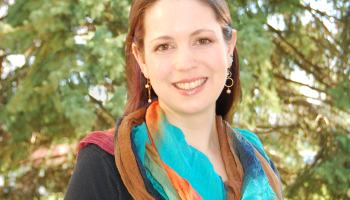Not Your Typical Sex Ed: Polyamory, STD Stigma, Feminism & Folklore
Dr. Jeana Jorgensen
We interviewed folklorist and sexual health educator Dr. Jeana Jorgensen to get her thoughts on sexuality, STDs, and communication in relationships. Dr. Jorgensen is an author, scholar, and public speaker specializing in studying folklore, gender, sexuality, and popular culture. She has a Ph.D. in folklore from Indiana University, where she focused on feminist fairy-tale retellings. Jorgensen has written several books and articles on fairy tales, mythology, and queer culture. She is also known for her work as a public speaker and educator, giving talks and workshops on issues related to gender, sexuality, and diversity. Additionally, she maintains a blog where she writes about various topics related to her academic and personal interests.
What is your background and how did you become a sex educator?
“My academic background began with a Ph. D. in folklore and a minor in gender studies. I wanted to know more about gender and sexuality, so I started writing for MySexProfessor.com in 2010. I had always been open-minded about sexuality. Learning more about it has benefited me in how I communicate and prioritizes things in my relationships.”
What topics are you most passionate about in terms of sex education?
“I am big on communication. Everyone should communicate in all relationships. From what I’ve seen, culture doesn’t teach us this. I believe transparent communication is important in terms of sexual health. There is shame and stigma surrounding STDs, yet we don’t have models to make these discussions. I like to have common-sense, clearly understandable ways for people to start the conversation about sex and STDs.”
I noticed on your blog “Sex Ed with Dr. Jeana” (where you write about alternative sexualities and more) you have a post titled 12 Pillars of Polyamory for everyone. Along the lines of the same topic, what are your thoughts on individuals living a polyamorous lifestyle and how they should approach STD testing?
“There aren’t a lot of cultural models [for polyamory], but non-monogamous relationships are typically viewed as cheating. [In these relationships], everything is honest and transparent. However, these individuals do have to be more on top of their sexual health. There are more partners, more risks.”
“I believe in frequent STD testing depending on health risks. Make sure you can talk about it and have a mature honest conversation. If you are in this type of relationship, maybe you should try to lead by example– Go get tested together to remove the stigma. You can initiate barrier use, like dental dams for oral sex. Lubrication is important during safe sex because it can reduce friction and condom breakage. Always manage your risks in a safe way.“
Jeana Jorgensen’s thoughts on feminism and sexuality.
“Feminism is important for bringing issues of sexuality into the light. Prior to the 1950s, you couldn’t talk about sex openly. Feminism has helped the conversation become more broad and accessible and mainstream. Overall, there are some versions of feminism that are sex-negative. Not all sex-related topics are inherently bad. The feminist movement has helped empower not only women but also men in opening up the discussion about sexuality.”
It’s easy to tell that you are a great storyteller based on your guest blog post about STDs in Rumor and Folklore. How do your interests in folklore and fairytales intermingle with your interest in being a sex educator?
“Folklore is broader than old wives tales. It is usually past-oriented. It gives prescriptive gender roles. These norms are replicated in contemporary culture. It is important to understand the messages of gender and sexuality. In terms of legends and rumors, because they are belief-based, they give us a direct line into peoples’ values. Folklore gives us a window to all of that. Studying this has given me the ability to meet someone where they are at and have an insight into their world.’ It’s a great conversation starter.”
What are your thoughts on STD testing?
“I feel like most sexually active people should get tested once a year. Even with non-sexual contact, it is especially good to know if there is an STD present that does not show tell-tale signs, like herpes. Everyone should have access to sexual education. You have to be better educated about the window in which you should get tested. We should have more knowledge about viral and bacterial infections as well. Knowing your risk is very important.”
What is the most interesting STD-related sex story you have heard?
“When I taught a course in the History of Sex Ed in the U.S., there was a story that was going around in the 1900s about a Harvard graduate who gave his virgin wife a venereal disease. She was said to have later died from it. He essentially lived his life a lonely tortured soul. It was told to inflict fear in everyone and to control sexuality.”

Secure and Confidential
STD testing services
The fastest results possbile - available in 1 to 2 days

Tagged
Categorized As
Author: Nick Corlis
Nick Corlis is a writer, marketer, and designer. He graduated from Texas State University in San Marcos, Texas, with a degree in Digital Communications. Nick is proud to be able to help eliminate the stigma of STD testing through his writing and is always trying to advocate the importance of your sexual health. Before STDcheck, his favorite way to develop his writing skills was by accepting various writing jobs in college and maintaining multiple blogs. Nick wears many hats here at STDcheck, but specifically enjoys writing accurate, well-researched content that is not only informative and relatable but sometimes also contains memes. When not writing, Nick likes to race cars and go-karts, eat Japanese food, and play games on his computer.




